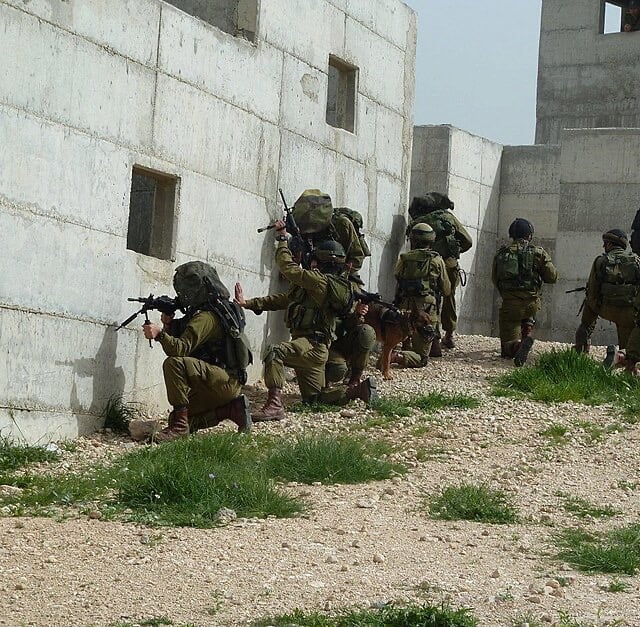The Israeli military has acknowledged missing its intended target after Gaza officials reported 10 Palestinians, including six children, were killed in a strike at a water collection point in Nuseirat refugee camp on Sunday morning.
The Israel Defence Forces (IDF) said it had aimed to hit an Islamic Jihad militant but a “technical error with the munition” caused the missile to fall “dozens of metres from the target.” The military expressed regret for civilian casualties and said the incident is under review.
Ahmed Abu Saifan, an emergency physician at Al Awda Hospital, confirmed 10 bodies were received after the strike on the water distribution point, with another 17 people wounded. Six of the dead were children, according to hospital officials.
Children Queuing for Water
The strike occurred as approximately 20 children and 14 adults were lined up to collect water on Sunday morning, according to Ramadan Nassar, a local resident. The area serves as a vital water collection point for residents of the densely populated refugee camp.
When the strike occurred, everyone ran and some, including those who were severely injured, fell to the ground,” Nassar told local media. Witnesses described scenes of panic as residents rushed to help the wounded.
Eyewitnesses reported that a drone fired a missile at the crowd queuing with empty jerry cans next to a water tanker in the heart of Nuseirat. The strike left bloodied children and lifeless bodies scattered across the area.
Military Response
The IDF issued a statement acknowledging the incident resulted from a technical malfunction. The military said it “works to mitigate harm to uninvolved civilians as much as possible” and “regrets any harm to uninvolved civilians.”
According to the Israeli military, the intended target was an Islamic Jihad militant operating in the area. The missile struck dozens of metres away from the intended location due to what officials described as a technical error.
The incident is now under review by military authorities. The IDF has not provided additional details about the nature of the technical failure or measures being taken to prevent similar incidents.
Wider Violence on Sunday
The water point strike was part of broader violence across Gaza on Sunday that killed 19 Palestinians in total, according to local health officials. The deaths included casualties from multiple Israeli operations in the besieged enclave.
In the central town of Zawaida, nine people were killed after an Israeli strike on a home, officials at Al Aqsa Martyrs Hospital reported. Two women and three children were among the victims of that attack.
Israel claimed it struck more than 150 targets across Gaza in the past day. The military has not provided details about the nature of these targets or their strategic significance.
Red Cross Aid Centre Attack
The latest strikes followed a deadly incident on Saturday when Israeli forces opened fire near an aid centre in Rafah. The Red Cross reported 31 people were killed in that incident.
The IDF maintained it fired only “warning shots” near the aid distribution site and was “not aware of injured individuals” as a result. The military has not explained the discrepancy between its account and the casualty figures reported by humanitarian organisations.
The targeting of locations where civilians gather for essential supplies has raised international concerns about adherence to humanitarian law. Water and aid distribution points have become frequent sites of casualties during the conflict.
Humanitarian Crisis Deepens
Gaza’s population faces severe water shortages amid the ongoing conflict, making water collection points essential for survival. The strip’s infrastructure has been heavily damaged by months of bombardment.
Residents must queue for hours to access clean water, often in exposed locations vulnerable to military strikes. The concentration of civilians at these sites has made them particularly dangerous during active hostilities.
International humanitarian organisations have repeatedly called for the protection of civilian infrastructure and gathering points. The targeting of water facilities may constitute a violation of international humanitarian law.
Conflict Background
The war in Gaza began following Hamas’s attack on Israel on 7 October 2023, which killed approximately 1,200 people and resulted in about 250 hostages being taken. Israel launched a major military campaign in response.
More than 58,000 Palestinians have been killed since the conflict began, with over half being women and children, according to Gaza’s health ministry. The ministry does not distinguish between civilians and combatants in its casualty counts.
Hamas currently holds 50 hostages, with fewer than half believed to be alive. Most others were released during previous ceasefire agreements or through other negotiations.
Ceasefire Negotiations
US President Donald Trump has said he is “closing in” on another ceasefire agreement that could see more hostages released and potentially wind down the war. Trump hosted Israeli Prime Minister Benjamin Netanyahu for talks this week.
After two days of discussions, no breakthrough was announced. A new sticking point has emerged regarding the deployment of Israeli troops during any potential truce, complicating negotiations.
Trump expressed optimism about reaching a deal “sometime next week” and said he would be “very firm” with Netanyahu about ending the conflict. The proposed framework includes a 60-day ceasefire with phased hostage releases.
International Pressure Mounts
The continuing civilian casualties have intensified international pressure for a cessation of hostilities. The targeting of water points and aid distribution centres has drawn particular condemnation from humanitarian groups.
UN officials have documented hundreds of Palestinian aid seekers killed near distribution sites since May. The pattern of strikes on civilian gathering points has raised questions about targeting procedures and rules of engagement.
As negotiations continue, the daily reality for Gaza’s population remains one of severe deprivation and danger. Access to basic necessities like water has become a life-threatening endeavour for civilians caught in the conflict.
Follow for more updates on Britannia Daily



